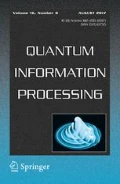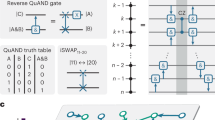Abstract
Current quantum processors are noisy and have limited coherence and imperfect gate implementations. On such hardware, only algorithms that are shorter than the overall coherence time can be implemented and executed successfully. A good quantum compiler must translate an input program into the most efficient equivalent of itself, getting the most out of the available hardware. In this work, we present novel deterministic algorithms for compiling recurrent quantum circuit patterns in polynomial time. In particular, such patterns appear in quantum circuits that are used to compute the ground-state properties of molecular systems using the variational quantum eigensolver method together with the RyRz heuristic wavefunction Ansätz. We show that our pattern-oriented compiling algorithms, combined with an efficient swapping strategy, produces—in general—output programs that are comparable to those obtained with state-of-the-art compilers, in terms of CNOT count and CNOT depth. In particular, our solution produces unmatched results on RyRz circuits.














Similar content being viewed by others
Notes
Source code: https://github.com/qis-unipr/padqc.
Benchmark circuits QASM files: https://github.com/qis-unipr/padqc/tree/master/benchmarks_qasm.
References
Feynman, R.P.: Simulating physics with computers. Int. J. Theor. Phys. 21(6–7), 467 (1982). https://doi.org/10.1007/BF02650179
Shor, P.W.: Algorithms for quantum computation: discrete logarithms and factoring. In: Proceedings of 35th Annual Symposium on Foundations of Computer Science, pp. 124–134 (1994). https://doi.org/10.1109/SFCS.1994.365700
Chiesa, A., Tacchino, F., Grossi, M., Santini, P., Tavernelli, I., Gerace, D., Carretta, S.: Quantum hardware simulating four-dimensional inelastic neutron scattering. Nat. Phys. 15, 455 (2019). https://doi.org/10.1038/s41567-019-0437-4
Lloyd, S., Mohseni, M., Rebentrost, P.: Quantum principal component analysis. Nat. Phys. 10(9), 631 (2014). https://doi.org/10.1038/nphys3029
Biamonte, J., Wittek, P., Pancotti, N., Rebentrost, P., Wiebe, N., Lloyd, S.: Quantum machine learning. Nature (2017). https://doi.org/10.1038/nature23474
Havlíček, V., Córcoles, A.D., Temme, K., Harrow, A.W., Kandala, A., Chow, J.M., Gambetta, J.M.: Supervised learning with quantum-enhanced feature spaces. Nature 567(7747), 209 (2019). https://doi.org/10.1038/s41586-019-0980-2
Zoufal, C., Lucchi, A., Woerner, S.: Quantum generative adversarial networks for learning and loading random distributions. NPJ Quantum Inf. 5(1), 1 (2019). https://doi.org/10.1038/s41534-019-0223-2
Cong, I., Choi, S., Lukin, M.D.: Quantum convolutional neural networks. Nat. Phys. (2019). https://doi.org/10.1038/s41567-019-0648-8
Tacchino, F., Macchiavello, C., Gerace, D., Bajoni, D.: An artificial neuron implemented on an actual quantum processor. NPJ Quantum Inf. 5, 26:1 (2019). https://doi.org/10.1038/s41534-019-0140-4
Ekert, A.K.: Quantum cryptography based on Bell’s theorem. Phys. Rev. Lett. 67, 661 (1991). https://doi.org/10.1103/PhysRevLett.67.661
Portmann, C., Renner, R.: Cryptographic security of quantum key distribution, cryptographic security of quantum key distribution. arXiv:1409.3525 (2014)
Fitzsimons, J.F.: Private quantum computation: an introduction to blind quantum computing and related protocols. NPJ Quantum Inf. (2017). https://doi.org/10.1038/s41534-017-0025-3
Córcoles, A.D., Kandala, A., Javadi-Abhari, A., McClure, D.T., Cross, A.W., Temme, K., Nation, P.D., Steffen, M., Gambetta, J.M.: Challenges and opportunities of near-term quantum computing systems. Proc. IEEE 108(8), 1338 (2020). https://doi.org/10.1109/JPROC.2019.2954005
Botea, A., Kishimoto, A., Marinescu, R.: On the complexity of quantum circuit compilation. In: The Eleventh International Symposium on Combinatorial Search (SOCS 2018) (2018)
Soeken, M., Meuli, G., Schmitt, B., Mozafari, F., Riener, H., De Micheli, G.: Boolean satisfiability in quantum compilation. Philos. Trans. R. Soc. A 378(2164), 1 (2019). https://doi.org/10.1098/rsta.2019.0161
Kliuchnikov, V., Maslov, D., Mosca, M.: Practical approximation of single-qubit unitaries by single-qubit quantum Clifford and T circuits. IEEE Trans. Comput. 65(1), 161 (2016). https://doi.org/10.1109/TC.2015.2409842
Munoz-Coreas, E., Thapliyal, H.: Quantum circuit design of a T-count optimized integer multiplier. IEEE Trans. Comput. 68(5), 729 (2019). https://doi.org/10.1109/TC.2018.2882774
Kandala, A., Mezzacapo, A., Temme, K., Takita, M., Brink, M., Chow, J.M., Gambetta, J.M.: Hardware-efficient variational quantum eigensolver for small molecules and quantum magnets. Nature 549(7671), 242 (2017). https://doi.org/10.1038/nature23879
Li, G., Ding, Y., Xie, Y.: Tackling the qubit mapping problem for NISQ-era quantum devices. In: Proceedings of the Twenty-Fourth International Conference on Architectural Support for Programming Languages and Operating Systems (2019), ASPLOS 19, pp. 1001–1014. https://doi.org/10.1145/3297858.3304023
Abraham, H., et al.: Qiskit: an open-source framework for quantum computing (2019). https://doi.org/10.5281/zenodo.2562110
Sivarajah, S., Dilkes, S., Cowtan, A., Simmons, W., Edgington, A., Duncan, R.: t\(|\)ket\(\rangle \): a retargetable compiler for NISQ devices. Quantum Sci. Technol. 6(1), 014003 (2020). https://doi.org/10.1088/2058-9565/ab8e92
Zulehner, A., Paler, A., Wille, R.: An efficient methodology for mapping quantum circuits to the IBM QX architectures. IEEE Trans. CAD Integr. Circuits Syst. 38(7), 1226 (2019). https://doi.org/10.1109/TCAD.2018.2846658
Russell, S., Norvig, P.: Artificial Intelligence: A Modern Approach, 4th edn. Pearson, London (2020)
Peruzzo, A., McClean, J., Shadbolt, P., Yung, M.H., Zhou, X.Q., Love, P.J., Aspuru-Guzik, A., O’Brien, J.L.: A variational eigenvalue solver on a photonic quantum processor. Nat. Commun. 5(4213), 1 (2014). https://doi.org/10.1038/ncomms5213
Barkoutsos, P.K., Gonthier, J.F., Sokolov, I., Moll, N., Salis, G., Fuhrer, A., Ganzhorn, M., Egger, D.J., Troyer, M., Mezzacapo, A., Filipp, S., Tavernelli, I.: Quantum algorithms for electronic structure calculations: particle–hole Hamiltonian and optimized wave-function expansions. Phys. Rev. A 98, 022322 (2018). https://doi.org/10.1103/PhysRevA.98.022322
IBM: Quantum computation center opens. https://www.ibm.com/blogs/research/2019/09/quantum-computation-center/
Greenberger, D.M., Horne, M.A., Zeilinger, A.: Going beyond Bell’s theorem. In: Kafatos, M. (ed.) Bell’s Theorem, Quantum Theory, and Conceptions of the Universe, pp. 69–72. Kluwer Academic Publishers, Amsterdam (1989). https://doi.org/10.1007/978-94-017-0849-4_10
Deffner, S.: Demonstration of entanglement assisted invariance on IBM’s quantum experience. Heliyon 3(11) (2017). https://doi.org/10.1016/j.heliyon.2017.e00444
Ferrari, D., Amoretti, M.: Efficient and effective quantum compiling for entanglement-based machine learning on IBM Q devices. Int. J. Quantum Inf. 16(08) (2018). https://doi.org/10.1142/S0219749918400063
Tucci, R.R.: QC Paulinesia. arXiv:quant-ph/0407215 (2004)
Papadimitriou, C.H., Steiglitz, K.: Combinatorial Optimization: Algorithms and Complexity. Dover Books on Computer Science. Dover Publications, New York (1998)
Cross, A.W., Bishop, L.S., Smolin, J.A., Gambetta, J.M.: Open quantum assembly language. arXiv:1707.03429 (2017)
Arute, F., Arya, K., Babbush, R., Bacon, D., et al.: Quantum supremacy using a programmable superconducting processor. Nature 574(7779), 505 (2019). https://doi.org/10.1038/s41586-019-1666-5
Wille, R., Große, D., Teuber, L., Dueck, G.W., Drechsler, R.: RevLib: an online resource for reversible functions and reversible circuits. In: 38th International Symposium on Multiple Valued Logic (ISMVL 2008), pp. 220–225 (2008). https://doi.org/10.1109/ISMVL.2008.43
Green, A.S., Lumsdaine, P.F., Ross, N.J., Selinger, P., Valiron, B.: Quipper: a scalable quantum programming language. SIGPLAN Not. 48(6), 333–342 (2013). https://doi.org/10.1145/2499370.2462177
JavadiAbhari, A., Patil, S., Kudrow, D., Heckey, J., Lvov, A., Chong, F.T., Martonosi, M.: ScaffCC: Scalable compilation and analysis of quantum programs. Parallel Comput. 45, 2 (2015). https://doi.org/10.1016/j.parco.2014.12.001. (Computing Frontiers 2014: Best Papers)
Acknowledgements
This research benefited from the HPC (High Performance Computing) facility of the University of Parma, Italy.
Author information
Authors and Affiliations
Corresponding author
Additional information
Publisher's Note
Springer Nature remains neutral with regard to jurisdictional claims in published maps and institutional affiliations.
Rights and permissions
About this article
Cite this article
Ferrari, D., Tavernelli, I. & Amoretti, M. Deterministic algorithms for compiling quantum circuits with recurrent patterns. Quantum Inf Process 20, 213 (2021). https://doi.org/10.1007/s11128-021-03150-9
Received:
Accepted:
Published:
DOI: https://doi.org/10.1007/s11128-021-03150-9




